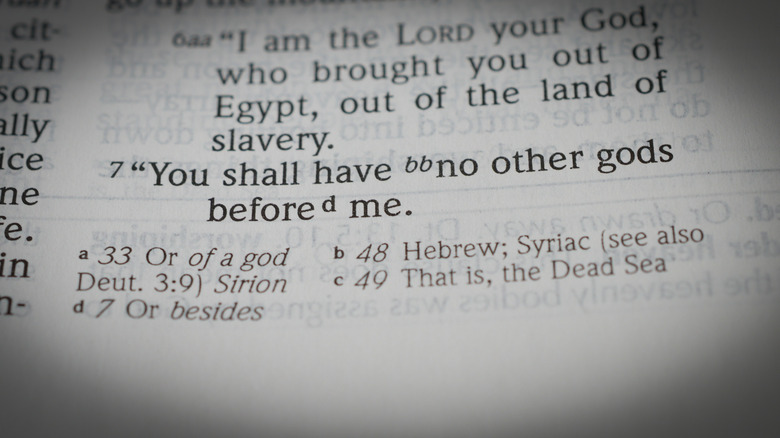The Ten Commandments Explained
Whenever we hear discussion of the Ten Commandments in the public discourse, it usually isn't about the actual content of the commandments, but about whether or not a statue of them should be placed in a public — and often political — space. One example is the ongoing court case regarding the construction of a monument to the Ten Commandments on the grounds of the state Capitol in Arkansas (via Arkansas Online).
In fact, many people may know more about these contested spaces than they do about the commandments that are emblazoned across them. Reuters reports that a 2007 poll found that Americans recalled the ingredients of a Big Mac more easily than they did the Ten Commandments. This is perhaps affected by the fact that God didn't have a good commercial copywriter, and that Moses apparently wasn't much of a speaker (via Exodus 4:10).
Although many people may struggle to remember their content, a 2019 YouGov America poll found that even a good number of non-religious people maintain that the Ten Commandments are "an important principle to live by." This is the Ten Commandments explained.
Law vs. gospel
Judaism maintains and seeks to follow to the letter the law given by the Torah and the Rabbinical interpretations found in the Talmud and Midrash. As explained in "Judaism as a Religious Legal System," this legal system is a significant part of Jewish identity. The journal article distinguishes how the Jewish legal system differs from the Christian views of the laws of the Torah: "a Christian cannot achieve salvation by works alone. For the Jew, however, observance of the law is central." This is at the crux of the dividing line between the two religions. Christians hold that Jesus, the fully divine, fully human son of God, fulfilled the law of God for us (via Matthew 5:17).
According to the article "Law and Gospel," by theologist John Frame, "The commands [the law in the Torah], typically, are not merely announcements of judgment, but God's gracious opportunities to repent of sin and believe in him [Jesus Christ]." Within a Christian framework — noting that there are nuances between denominations — the law of God is good and valuable, but it does not lead to salvation because of humanity's inability to follow it perfectly. Hence why the gospel of Jesus Christ (and not the law of God) is central to the Christian belief system (via Romans 8:1-8). So just as the Bible is divided between the Old and New Testaments, so are the belief systems of the Jewish and Christian communities.
No other gods
According to a YouGov America poll, "You shall have no other gods before me" is the commandment tied for second to last place in the level of importance for non-religious people. This is probably not surprising to anyone who is aware of the contemporary drop in the number of religious people in America and the rise of people who self-identify as atheists or agnostics (via Pew Research). Yet for religious people, this is perhaps the most essential commandment. Ligonier argues that this commandment is how "God reveals what it means for Him to be our God and for us to be His people. "The relationship built between God and his people is central to the context of the rest of the commandments. If we are part of God's people, then we understand the ways in which the other commandments break our relationship with God and, by extension, other people.
It is also good to note that the cosmos in which the Hebrews lived did not consist of just the Hebrew God and a bunch of fake idols, but that their world consisted of many gods who vied for the attention of the Hebrews. As Haaretz puts it, "the different scribes who wrote most of the biblical canon believed the incorporeal world was populated by a multitude of gods, but that the Hebrews should not worship any of these other deities, only Yahweh." So this commandment was an immanent call to a relationship with Yahweh.
No idols
The next commandment has much in common with the last in that it is based on worship turned away from God being unworthy: "You shall not make for yourself an idol."
Theology of Work defines this commandment as "Idols are gods of our own creation, gods that have nothing to them that did not originate with us, gods that we feel we control." Take for instance the golden calf that was made by the Hebrew people as they impatiently waited for Moses to come down from Mt. Sinai in Exodus. This was a man-made idol, which the Hebrews sought to worship. This golden calf is interpreted to be a revival of the Egyptian worship of Apis, a sacred bull deity, as explained by Britannica. When Moses arrived, he destroyed the idol in a fire, upset that the people had made "gods of gold."
Whether they are physical or not, idols are expressions of anything that we, as humans, think we have complete power and control over, like money or fame (via Theology of Work).
Within a Jewish context, these first two commandments fall in the same legal vein. There is not much division between worshipping gods and man-made images, and they both concentrate on the danger of being seduced away from God. Jewish Encyclopedia explains that "in the century between the return from the Exile and the termination of the Babylonian Talmud, the Jews were thoroughly weaned from all belief in idols, although superstition itself can never be wholly eradicated."
Do not take the lord's name in vain
It is common to hear this commandment used as a condemnation of cussing, which is a somewhat simple interpretation. There are a couple of ways this commandment could be understood. ReThink defines it as: "We are forbidden from taking the name of God (representing Him) in a manner that is wicked, worthless, or for our own gain." This interpretation could include television evangelists or cult leaders. Within Jewish belief, the "holiness of God's name was such that an offense against that name was considered a severe crime" (via Encyclopedia.com).
Another name for cussing is swearing and this is, perhaps, a better understanding of the commandment as a whole. Swearing has taken on a connotation of cussing, but when we are "swearing in" within a court context, we are saying that we are representing the truth, that our words are honest. Israel Bible Weekly puts it this way: "When the Bible proscribes taking the Lord's name in vain, it does not refer to saying 'God' as an exclamation or expletive; instead, it prohibits invoking the divine name in an oath, and then failing to fulfill that oath."
Keep Sabbath
In the YouGov America poll, keeping the Sabbath was the least important commandment for the non-religious. This is not at all surprising considering the rise of capitalist industry and the increasing segmenting of time into paid wage labor. As Abraham Heschel put it in "The Sabbath," "Six days a week we wrestle with the world, wringing profit from the earth; on the Sabbath we especially care for the seed of eternity planted in the soul. The world has our hands, but our soul belongs to Someone Else." (via New Voices).
The Sabbath is a reminder of God's creation of the world and how he chose to rest on the seventh day according to the Torah. However, it also gives a chance for those who work for us and animals we utilize to rest as well (via My Jewish Learning). As New Voices argues, "Shabbat, then, is a means of defiance. It reminds us that we can be separate from the machinery of empire. We are loyal to our communities and to G-d, rather than the missions of capitalism and imperialism. Shabbat forcibly wrenches us from the timescape of capital and accumulation." The Sabbath provides an opportunity for rest in a world that consistently demands more of our labor, time, and attention.
Honor your mother and father
John Calvin, the Protestant reformer, wrote about honoring one's parents in volume 3 of "Harmony of the Law." He says that this commandment involves three elements, including giving due respect to parents, being obedient to parents, and that children should take care of their parents. While Calvin would definitely find critics within modern understandings of family dynamics, even he maintains that parents are not without sin and that in those spaces where they diverge from the word and wisdom of God, the child is free of obedience to them (via Christian Classics Ethereal Library).
What does it mean to honor your parents in an abusive situation? Bible Study Tools argues that "God certainly doesn't want us to remain in abusive situations. His compassionate heart for us aches when we suffer at the hands of injustice" but that it is important to follow this commandment even in difficult circumstances because it "teaches us to trust Him to ultimately defend and protect us." This is a hard thing to do for anyone who has been deeply hurt by their parents, but it remains important enough to be one of the Ten Commandments.
Do not murder
Most people agree that murdering people is wrong, and "Thou shalt not kill" remains the commandment that is most important to people across the board, religious or otherwise (via YouGov America). However, the debate around the translation of this commandment between "kill" and "murder" continues to this day (via Wilma A. Bailey), as do ethical questions around war and capital punishment that test the boundaries between these various interpretations.
Rabbi Marc Gellman states in the Chicago Tribune that "killing is taking a life. Murder is taking a life with no moral justification. Murder is morally wrong, but there is wide moral agreement (not complete agreement) that some forms of killing are morally just." According to Death Penalty Information Center, 59% of white Evangelicals support the death penalty and 52% of white mainline Protestants support it, while the numbers are significantly lower amongst Catholics and Jewish communities as well as non-white Protestants.
Yet there are a number of Christians and Jews who would argue that this commandment encompasses a wider understanding of what it means to take a life. Stanley Hauerwas, for instance, is a theologian and pacifist who sees the Christian life as one of nonviolence. "Jesus is a politic and it is a politic of the formation of people who live by non resistant love across time by establishing ways of surviving in a violent world by being non violent which is a very dangerous way to be," he says (via The Table).
Do not commit adultery
The Jewish Encyclopedia explains that Jewish law does not recognize a husband's infidelity as a crime, and it was "not until comparatively recent times that the woman was legally entitled to enforce her husband's faithfulness, and was given the right to demand a bill of divorce for his sexual immorality." Within Christian theology, Catholics and Reformed Protestants both considered adultery, regardless of its form, outside of marriage to be condemned by God (via Catechism of the Catholic Church and Calvin's Commentary on the Bible).
The commandement of "Thou shalt not commit adultery" does not run into much backlash outside of the more patriarchal rulings in Jewish law. Most people today appear to believe that marriage demands commitment, which seems to show itself in a growing number of people who either remain unmarried or cohabitate with their significant other instead of entering into a marriage contract (via Pew Research). One does not have to worry about adultery (in a purely literal sense) if one is not married.
Do not steal
Martin Luther states in his Larger Catechism that property "God wishes to have protected, and He has commanded that no one shall subtract from, or curtail, his neighbor's possessions. For to steal is nothing else than to get possession of another's property wrongfully, which briefly comprehends all kinds of advantage in all sorts of trade to the disadvantage of our neighbor."
The commandment "Thou shalt not steal" is generally accepted within wider society (via YouGov America). The U.S. has a strong understanding of the right to property, in that our property cannot be taken away by the government as well as limitations on eminent domain practices (via PBS). Yet, property becomes a complex concept within a wider capitalist structure.
Bradford Littlejohn dives into this assumed interpretation of the commandment when he states: "that most of the specifications of the eighth commandment in the Torah...aimed more to protect the "have-nots" (that is to say, the relatively impoverished) against the "haves". ...Whatever our protestations to the contrary, modern defences of private property generally have the tenor of a protection of the haves against the have-nots."
Do not bear false witness
Bearing false witness deals with lying about our neighbor or slandering their name or deceiving them in any way (via Matthew Henry Commentary). The commandment "Thou shalt not bear false witness against thy neighbour" links in a way to not taking the Lord's name in vain, because just like we are not to speak wrongly and intentionally deceive others about God, we are not supposed to intentionally misreport the character of another person nor deceive them in any way.
Tablet addresses the issues that flow from bearing false witness, saying that "The Bible, foreseeing this possibility, imposes a fitting punishment on such conspiring witnesses: 'You shall do unto him as he conspired to do to his brother.' That is, someone who gives false testimony that could lead to the defendant's execution is himself executed." This is all good and fine until we look at witnesses who slander or cases that do not involve violence and death. It was in these spaces that Rabbis came up with appropriate verses of restitution for false accusers. They imposed 40 lashes for lying about the ineligibility for a man to become priest and fines for false witness that led to loss of money.
Theology of Work argues that the nuances of bearing false witness carry over into many aspects of modern life, including advertising, work gossip, and misleading employees, for instance.
Do not covet
John Calvin, the Protestant reformer, addressed the seeming superfluousness of this commandment after the last commandments discussed. Isn't stealing and adultery and false witness on some level coveting something of our neighbor's? He clears up this issues by saying, "Design, such as we have spoken of in the previous commandments, is a deliberate consent of the will, after passion has taken possession of the mind. Covetousness may exist without such deliberation and assent, when the mind is only stimulated and tickled by vain and perverse objects" (via Spurgeon.org).
In many ways, this is doing exactly what Jesus does in the New Testament when he states that not only do actions matter, but the very thoughts behind those actions, too, break the law of God, according to Matthew 5. This commandment, in many ways, seems to only make the obedience of the other commandments that much harder, because our control over our thoughts and desires is markedly more difficult.
Maimonides, the Jewish Medieval philosopher, states "Coveting leads to robbery. For if the owners do not desire to sell, despite a generous offer and much supplication, motivated by a desire for the item, a person may revert to robbery... And if the owner were to resist and attempt to save his property..., then the perpetrators may be moved to murder" (via Chabad.org). This understanding of coveting is essentially creating a boundary so that we do not cross into the realms of disobedience outlined in the other nine commandments.
The Ten Commandments vs. The Sermon on the Mount
While the Ten Commandments remain compelling in how believers use them to organize their lives and the moral stakes that are at hand, there is some contrast with part of Jesus' Sermon on the Mount. Between Matthew 5 and 7, we find varying explications of interpersonal topics and how people of faith should live, such as expansion on the topic of adultery. In one way or another, within the Sermon on the Mount, subjects pertaining to the content of the Ten Commandments are discussed, yet the distinction between law and gospel is apparent, and it is clear that Jesus is not just repeating the commandments, but showing the underlying motivation behind them. Thinking Faith explains, "In other words, the commandment to love one's neighbour does not replace the Ten Commandments. It sums them up, observes them and explains their purpose: they are ways of expressing love for one's neighbour."












